Michael Cohen painted as a thief and a profiteer who orchestrated a failed poll rigging scheme to boost Donald Trump’s image and made $4 MILLION off attacks on the ex-president – and may run for Congress
Michael Cohen, Donald Trump’s former fixer and lawyer, made a series of startling admissions in court on Monday, where he is the key witness linking the former president to a plot to conceal hush-money payments to porn stars.
Yes, he had lied under oath, he admitted.
Yes, he stole tens of thousands of dollars from his former employer, the Trump Organization, he said.
Yes, he had worked with an IT company to manipulate an online poll in Trump’s favor.
And when he admitted to deceit and lies in public statements, he said he had a future career in mind: member of Congress.
Michael Cohen leaves his apartment with his wife on Monday morning, ahead of his fourth day on the witness stand in the ‘hush money’ trial of former President Donald Trump
His name recognition would be an asset, he said.
“Chasing President Trump, is that your name recognition?” asked Trump attorney Todd Blanche.
“I owe my name recognition to the journey I have made,” he replied. “It has ties to Mr. Trump, yes, not because of Mr. Trump.”
Cohen spent his fourth day on the witness stand. He is the key piece of evidence directly linking Trump to a scheme to falsify company records to hide $130,000.
Trump denies 34 counts of document falsification.
But the final two and a half hours of Cohen’s cross-examination reminded the jury of the caveats that come with the testimony of a disbarred attorney who served 13 months in prison.
Blanche used the time to portray Cohen as a money-grubbing self-publicist in the making, with books, film projects and podcasts.
He questioned Cohen about existing testimony in which he said he had paid off Red Finch, a technology company used by the Trump Organization to manipulate an online poll, which was owed $50,000.
He said he withdrew $20,000 from his bank in two days before paying the company boss in cash in a brown paper bag.
But in a handwritten note outlining how he would be compensated, he claimed the full $50,000 (doubled to $100,000 to account for taxes).
“So you stole from the Trump Organization?” Blanche asked.
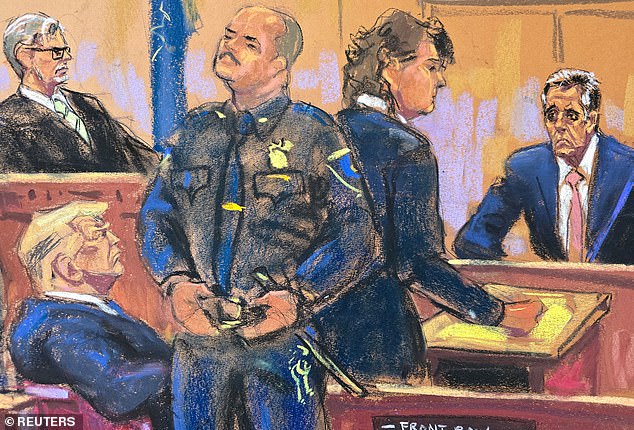
When Cohen admitted to stealing from the Trump Organization, his former boss shook his head
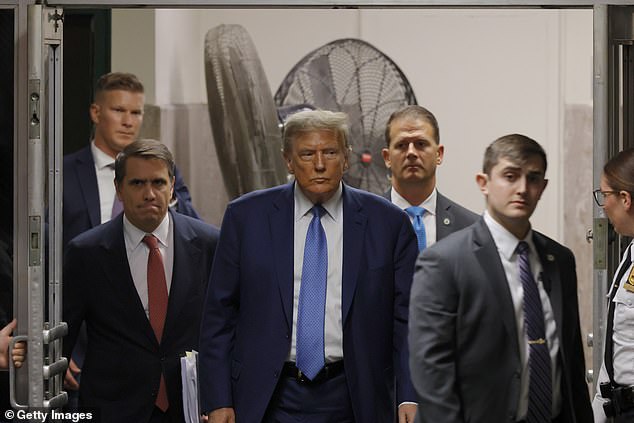
Trump denies 34 counts of falsifying company records to cover up a $130,000 hush money payment to porn star Stormy Daniels. We see him arriving here with attorney Todd Blanch
“Yes sir,” Cohen said.
Trump had paid little attention to the evidence until now, sitting slumped in his chair with his eyes closed.
But he came alive when he confessed to the theft, shaking his head and grinning.
His son Eric, who sat in the second row of the courtroom, wrote, “This just got interesting: Michael Cohen now admits to stealing money from our company.”
Later, questioned by prosecutor Susan Hoffinger, he explained his reasoning, saying he was angry about the way his annual bonus had been cut by two-thirds.
‘I felt like it was almost self-help. “I wasn’t going to give him the advantage… also like this,” he said, explaining that he decided not to correct the company’s chief financial officer, who knew the bill was $50,000.
“Not only had I protected him as best I could, but I had also given money to Red Finch a year and a half earlier and another $130,000 to have my bonus cut by two-thirds was very upsetting to say the least. ‘
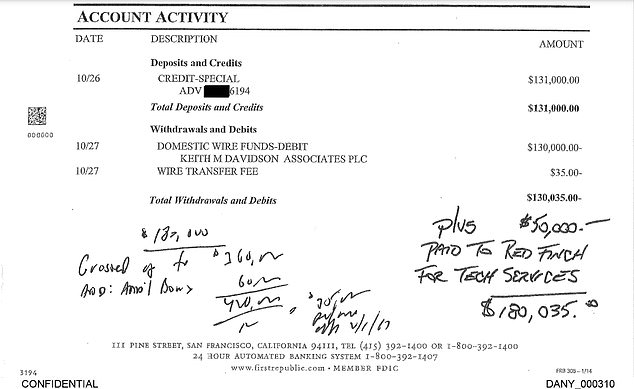
The handwritten note showed what Cohen was paid for, including $50,000 for Red Finch. This was introduced during the first part of the process, but resurfaced on Monday

Trump’s son Eric sat in the second row of the courtroom Monday morning
He also explained why Red Finch was hired: to manipulate a CNBC poll of the most famous businessmen of the past century.
Trump was afraid he wouldn’t even make it into the top ten.
“And it upset him,” he said.
Red Finch used the money to buy IP addresses that it could use with an algorithm to elevate Trump.
He ultimately finished ninth, Cohen said. But because CNBC decided not to advance the top ten to another stage of the competition, Trump refused to pay, saying he didn’t get the benefit of the money.
It was another extraordinary insight into the way Trump and his top aides operated in the run-up to the 2016 election.
Once again, Trump brought a large entourage to court. In addition to members of Congress, he was joined by legal experts Alan Dershowitz and Chuck Zito, whose status as founder of the New York chapter of the Hells Angels was betrayed by his jet-black pompadour.
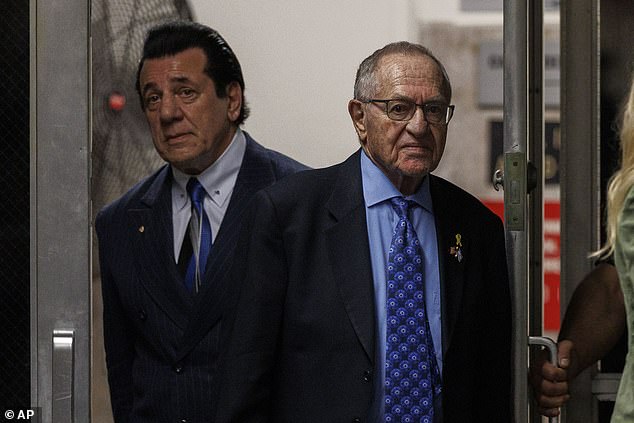
American actor Chuck Zito (left) and lawyer Alan Dershowitz return from lunch to the trial of former President Donald Trump at Manhattan Criminal Court, Monday, May 20, 2024
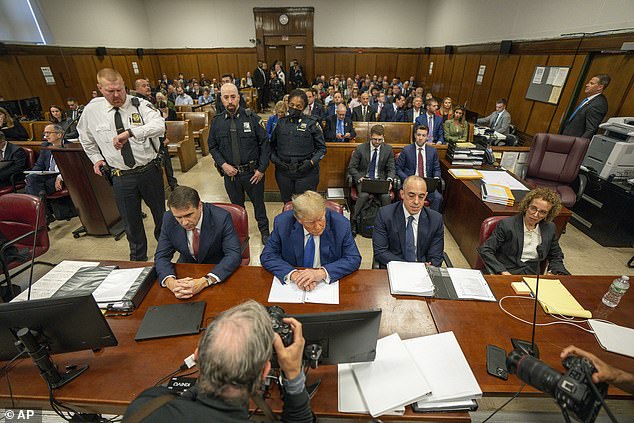
Trump brought a large entourage with him on Monday, including members of Congress and legal experts
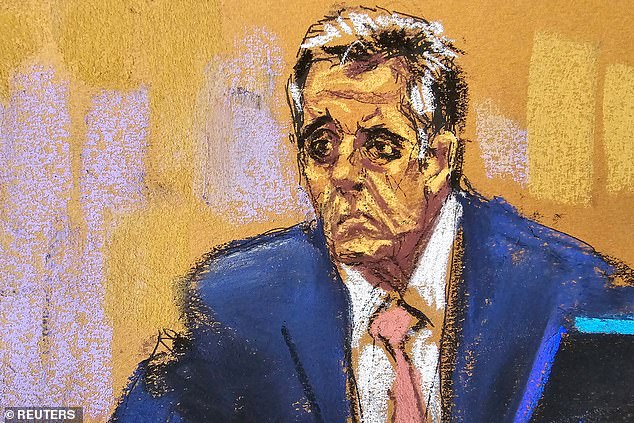
Cohen gave his testimony in a calm, measured tone. He quietly corrected Blanche several times, but did not raise his voice or show much emotion on his fourth day in court
They heard Cohen describe how he made millions using Trump’s name when the former president’s lawyer accused him of having a financial interest in a conviction.
Cohen said he had earned about $4.4 million as of fall 2020, with $3.4 million coming from two books and another million from podcasts.
In fact, Blanche said he was even pitching a TV show about his life called “The Fixer.”
But Cohen pushed back on the idea that he had a financial interest in a guilty verdict.
“Whether Mr. Trump is ultimately found innocent or guilty will have no bearing on whether I speak about it or not,” he said.
And then he offered an alternative view of what was best for his finances, as Trump leaned back in his chair and turned his head toward the witness.
“For me it’s better if he is found not guilty because then I have more to talk about in the future,” he said.
